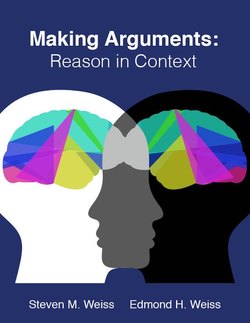Читать книгу Making Arguments: Reason in Context - Edmond H. Weiss - Страница 10
На сайте Литреса книга снята с продажи.
Principle #1—Arguing is primarily a rational activity.
ОглавлениеWhen one disputes with a family member, a friend, or a stranger (in a confrontation), what characterizes the communication event is its psychology. The motive (as well as expected outcomes) is what drives the contentious situation. No matter how right or justified one feels in “arguing,” the primary aim is to self-satisfy, to have the feeling of interpersonal power. While such a disagreement might entail an attempt to provide good reasons, it is generally not judged for its appropriateness, logic, organization, clarity, or language.
In contrast, argumentation, as we present it in this book, is an idea surrounded by rules and norms that go beyond the emotions and psychological needs of the arguers. Argumentation is rational, meaning that it proceeds according to regularities and traditions over which the participants have little control, but to which they must acquiesce. In the same way that scientists need to adhere to methods and rules of inference, arguers must accept some “rules” for rational discourse.
This is not to say that arguers should lack emotion or that argument must proceed in an emotional vacuum, without regard for the feelings of the advocates. Rather, what we are suggesting is that one should not mistake the passions of the arguers for the arguments they are making. The way we formulate, craft, present, and judge argument is distinct from the circumstances that bring about disagreement. Saying something loudly does not make the statement any truer or more credible.
Further, in interpersonal conflict, the source of the dispute is sometimes purely relational, that is, a contest of wills or a battle for affection or control. In contrast, the controversy in a rational dispute, what this text calls an argument, might rely wholly on the positions arguers are assigned arbitrarily in a controversy. College debaters, for example, are told the positions (affirmative or negative) they are to argue without deference to their feelings or emotions on an issue. So, a student who is committedly anti-drug, but also a skillful advocate, can make a compelling case to legalize all drugs. His or her personal commitment is simply irrelevant to the rational process of adjudicating the defense of a claim.
Emotional advocates can trigger the emotions of an audience, but this does not constitute good arguing. For example, an openly gay student in an argumentation class, while debating in favor of the legalization of gay marriage, personalized the issue: “If you vote against this proposal, then you are telling me that I am less of a human being than you are.” While this is a poignant example of how someone personally experiences injustice, it doesn’t go very far in advancing the case. Interestingly, when the same student had to attack gay marriage (in his next debate), he did a better job, not because the other side of the issue is stronger, but because he detached himself from the issue and saw some larger, demonstrable societal impacts.
